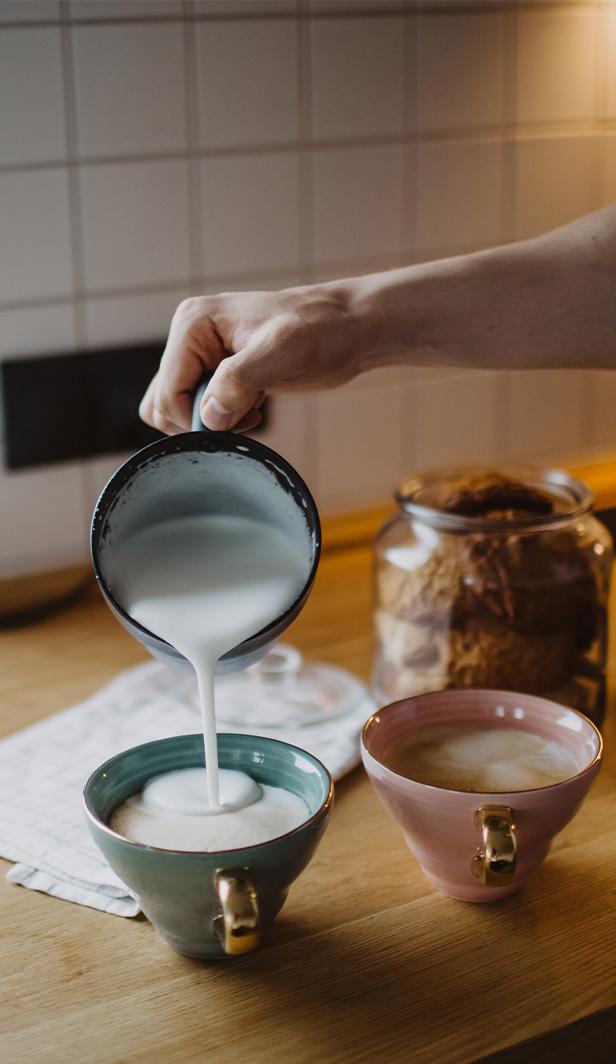What is Decaf Coffee?
Coffee beans naturally contain caffeine. Although the beans can be processed to remove most of the naturally-occurring substance, creating a drink that could be enjoyed any time of the day. Decaf coffee has the same taste as regular coffee, but has the majority of its caffeine removed. Decaf coffee still contains a very small amount of caffeine, around 3% compared to regular coffee, since 100% of caffeine can’t be removed completely. There are many ways to remove caffeine from coffee beans, most of which include water, organic solvents, or carbon dioxide.
How is Decaf Coffee Made?
Since NESCAFÉ created the first decaffeinated coffee in 1961, various methods have emerged to extract the caffeine from the coffee bean such as; The Swiss Water Method, Carbon Dioxide, and Methyl Chloride. However, NESCAFÉ uses a decaffeination process with water that allows all the aroma and flavour of the coffee to be preserved.

Decaf: The NESCAFÉ Way
Before being roasted, the coffee beans are immersed in a flow of hot water to extract the majority of the caffeine, since caffeine is soluble in water. There are various types of coffee beans, the main two being Arabica and Robusta, both with different concentrations of caffeine. Therefore, the parameters of the decaffeination process will vary depending on the mixture of coffees that need decaffeinating.
Once the caffeine has been extracted from the coffee beans in the liquid phase, the coffee beans are then dried using hot air that evaporates the water used in the previous process. Once the usual moisture of coffee beans is recovered, the result is a coffee bean with a fraction of the caffeine, around 97% less, which retains the same properties of flavour and feel as regular or untreated coffee beans, but with a typical cup of decaf coffee containing 2mg of caffeine, in comparison of between 70 – 140mg in a cup of regular coffee. From this moment on, the coffee beans are ready for roasting following the same method as regular or untreated coffee, which gives rise to NESCAFÉ decaffeinated coffee.

Carbon Dioxide
Carbon dioxide can separate different chemical substances, and in this instance, can separate caffeine from coffee. It achieves this separation by being pumped through the coffee beans. This supercritical CO2 reaches into the crevices of coffee beans like a gas but dissolves caffeine like a liquid.
After the beans have been soaked in water, a process which expands cell structures and makes it easier to extract the caffeine molecules, they are exposed to supercritical CO2 for several hours. Due to this method leaving the carbohydrates and proteins intact, there is less change in the taste as a result of decaffeination.

Methyl Chloride
Methylene chloride is a chemical solvent that removes caffeine from coffee beans. Back in the day, benzene was the chemical of choice until it was discovered to be carcinogenic . Now, companies have switched to other chemicals, most commonly ethyl acetate and methylene chloride. However, there has been more controversy about methyl chloride, due to exposure to high amounts being toxic and leading to central nervous system damage.
First, the beans are treated with steam to draw the caffeine from the inner coffee bean to the outer surface area of the bean. Once this has been done, the Methyl Chloride is applied directly to the beans, removing the caffeine, the steam is again applied to the coffee. This drives out any residual solvent. Then, the beans are dried and roasted just like any other green coffee bean. This type of decaffeination removes between 96% and 97% of caffeine from a batch of coffee.

To Decaf or not to Decaf?
You may be wondering if decaf coffee is the right choice for you. There is no right or wrong answer as it depends on each individual’s preference. NESCAFÉ offers a wide range of decaf coffees, and both decaf and regular coffee have their place in a balanced diet and healthy lifestyle.
It’s worth remembering that whilst caffeine is significantly reduced in decaf coffee, it isn’t caffeine-free. Comparisons between decaffeinated coffee and regular coffee have found that decaf coffee contains, on average, 97% less caffeine.
Whatever you prefer, more options like decaf coffee open up endless possibilities to make the most of your day with more choice, more tastes and more convenience!

Today’s community favourites




